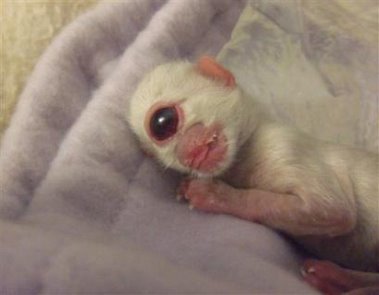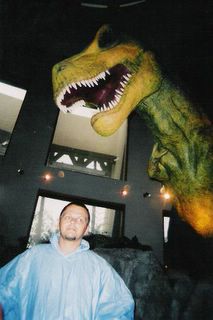YES!
Can I Pre-Order? 4 Dragons, 2 Griffins, 1 Unicorn, 1 Pegasus, 2 Scylla, 1 Chimera...Ooh, What's That? 1 Hydra, 12 Flying Cats...
from Sploid
Mad
 scientists in California have a terrible vision for your family's future: genetically engineered dragon monsters living in your home, as pets.
scientists in California have a terrible vision for your family's future: genetically engineered dragon monsters living in your home, as pets.According to The Economist, a biotech company called GeneDupe is close to creating living dragons that will be sold as pets.
Animals rights activists and those opposed to genetically-modified food have been outraged by the company's plans, which are outlined in the March 30 issue of the business magazine.
GeneDupe is currently building "virtual" dragons and other mythological creatures.
By combining the cells of real animals - lizards, for example, in the case of a dragon - with a sort of high-speed intelligent design, GeneDupe scientists will create cell patterns and DNA for monsters.
Right
 now, the beasts have not left the computer. But they will soon, according to Dr. Paolo Fril, chairman and chief scientific officer for GeneDupe in San Melito, California.
now, the beasts have not left the computer. But they will soon, according to Dr. Paolo Fril, chairman and chief scientific officer for GeneDupe in San Melito, California."This involves synthesizing, with actual DNA, the genetic material that the computer models predict will produce the mythical creatures," reported The Economist.
"The synthetic DNA is then inserted into a cell that has had its natural nucleus removed. The result, Dr Fril and his commercial backers hope, will be a real live dragon, unicorn or what have you."
But it seems the company is better at announcing outrageous plans than successfully bringing living monstrosities to market.
In 2000, GeneDupe boldly announced that a customized goldfish would soon go on sale. The expensive pets would be genetically altered to order - a goldfish could literally have gold flakes in its scales, or be grown in the colors of the French flag.
Savvy Internet readers found some suspicious holes in the GeneDupe story today.
For
 one thing, The Economist seems to be the only business publication paying any attention to the shady company's pipe dreams.
one thing, The Economist seems to be the only business publication paying any attention to the shady company's pipe dreams.For another, if the town of San Melito exists in California, it does not appear on any known maps.
In fact, the only references to San Melito on the entire World Wide Web are in Economist articles about GeneDupe, which either means the renowned centuries-old business publication is propping up a fraudulent company or that the whole thing is a cruel joke published two days before April 1.








 loves its moose, even its robot moose. Shoot one of these majestic beasts,
loves its moose, even its robot moose. Shoot one of these majestic beasts, 
 top European space scientist says humans must send a
top European space scientist says humans must send a  has backed down from its plan to completely kills the space agency's search for extraterrestrial life.
has backed down from its plan to completely kills the space agency's search for extraterrestrial life.
 has taken a giant leap towards perfection with the announcement of the
has taken a giant leap towards perfection with the announcement of the  frightening "leprechaun" has taken up residence in a poor neighborhood outside of Mobile, Alabama - and one little town's problem has become
frightening "leprechaun" has taken up residence in a poor neighborhood outside of Mobile, Alabama - and one little town's problem has become  story might never have been known outside the poor community if not for a
story might never have been known outside the poor community if not for a  Australian water witch has discovered a
Australian water witch has discovered a  more is there to say? It's a turtle, it's got two heads.
more is there to say? It's a turtle, it's got two heads.  would have been tough for South Park to top the Scientology-bashing of "
would have been tough for South Park to top the Scientology-bashing of " lot of us don't agree with the choices the Chef has made in the last few days," one of the children eulogizes him at a funeral. "Some of us feel hurt and confused that he seemed to turn his back on us. But we can't let the events of the past few weeks take away the memories of how Chef made us smile.
lot of us don't agree with the choices the Chef has made in the last few days," one of the children eulogizes him at a funeral. "Some of us feel hurt and confused that he seemed to turn his back on us. But we can't let the events of the past few weeks take away the memories of how Chef made us smile.
 and interactive experiences will encourage visitors to learn about real life science and technology through the mythic powers of Super Heroes. Is there a biological basis to Hulk's transformation? How can knowledge of simple mechanics help us command the strength of Iron Man? Visitors of all ages will enjoy finding the answers to these questions and more as they learn about science and technology while living the fantasy of their favorite Marvel Super Hero.
and interactive experiences will encourage visitors to learn about real life science and technology through the mythic powers of Super Heroes. Is there a biological basis to Hulk's transformation? How can knowledge of simple mechanics help us command the strength of Iron Man? Visitors of all ages will enjoy finding the answers to these questions and more as they learn about science and technology while living the fantasy of their favorite Marvel Super Hero. 
 Investigate the Incredible Hulk's brain and learn which areas are responsible for generating human emotions such as rage — the key to Hulk's super abilities
Investigate the Incredible Hulk's brain and learn which areas are responsible for generating human emotions such as rage — the key to Hulk's super abilities 


 Visitors can also become a real life Iron Man by stepping into an exo-suit to lift a Scion xB, a vehicle weighing nearly 2500 lbs. By experimenting with simple levers and pulleys to lift weights, they will learn what the future holds for increasing human strength.
Visitors can also become a real life Iron Man by stepping into an exo-suit to lift a Scion xB, a vehicle weighing nearly 2500 lbs. By experimenting with simple levers and pulleys to lift weights, they will learn what the future holds for increasing human strength.  In another area, visitors will explore the wonders of Spider-Man when they learn about the elasticity and strength of spider webs. Here they will be able to test the strength of a synthetic fiber, similar to spider silk, called Technora™.
In another area, visitors will explore the wonders of Spider-Man when they learn about the elasticity and strength of spider webs. Here they will be able to test the strength of a synthetic fiber, similar to spider silk, called Technora™.  entering the Xavier Institute for Higher Learning will interact with the X-Men and discover how genetic mutation can evolve into super abilities. They can see how matter changes from one state to another when Iceman transforms himself into ice or explore the magnetic fields that protect Magneto. Guests can examine Wolverine's skeleton—strengthened by an indestructible metal—and then learn about artificial parts developed by biomedical engineers to enhance patients' lives. In the Danger Room, which focuses on Banshee's sonic superpowers, visitors can discover the physical nature of sound waves and learn about their unique properties. They can create motion with the sound emitted from a tuning fork and explore how sound is used in current technology—from ultrasound to sound guns.
entering the Xavier Institute for Higher Learning will interact with the X-Men and discover how genetic mutation can evolve into super abilities. They can see how matter changes from one state to another when Iceman transforms himself into ice or explore the magnetic fields that protect Magneto. Guests can examine Wolverine's skeleton—strengthened by an indestructible metal—and then learn about artificial parts developed by biomedical engineers to enhance patients' lives. In the Danger Room, which focuses on Banshee's sonic superpowers, visitors can discover the physical nature of sound waves and learn about their unique properties. They can create motion with the sound emitted from a tuning fork and explore how sound is used in current technology—from ultrasound to sound guns.  Bogus Healer Convicted in Mermaids Case
Bogus Healer Convicted in Mermaids Case convicted of theft by false pretenses, court officials said Tuesday.
convicted of theft by false pretenses, court officials said Tuesday. of the money was to be used to buy a bull whose genitals — described in court as the animal's "strong part" — would point out the car thief, prosecutors said.
of the money was to be used to buy a bull whose genitals — described in court as the animal's "strong part" — would point out the car thief, prosecutors said. on Spike TV's first original scripted offering Blade: The Series has begun this week in Vancouver, Canada. New Line Television will produce 11, one-hour episodes of the weekly action-adventure series which premieres on Spike TV starting Wednesday, July, 5, following the previously announced two-hour kick-off episode that premieres on June 28.
on Spike TV's first original scripted offering Blade: The Series has begun this week in Vancouver, Canada. New Line Television will produce 11, one-hour episodes of the weekly action-adventure series which premieres on Spike TV starting Wednesday, July, 5, following the previously announced two-hour kick-off episode that premieres on June 28.
 seemingly normal house cat in Tunisia has given birth a litter of five adorable kittens...and
seemingly normal house cat in Tunisia has given birth a litter of five adorable kittens...and  video
video



 South Park has declared war on Scientology. Matt Stone and Trey Parker, creators of the animated satire, are digging in against the celebrity-endorsed religion after a controversial episode mocking outspoken Scientologist Tom Cruise was yanked abruptly from the schedule Wednesday — with Internet rumors it was covert warfare by Cruise that led to its departure.
South Park has declared war on Scientology. Matt Stone and Trey Parker, creators of the animated satire, are digging in against the celebrity-endorsed religion after a controversial episode mocking outspoken Scientologist Tom Cruise was yanked abruptly from the schedule Wednesday — with Internet rumors it was covert warfare by Cruise that led to its departure.  Cruise's representative, Arnold Robinson, told The Associated Press Friday that the mega-star made no such demands.
Cruise's representative, Arnold Robinson, told The Associated Press Friday that the mega-star made no such demands. episode in question, "Trapped in the Closet," (
episode in question, "Trapped in the Closet," ( battle began in earnest earlier this week when Isaac Hayes, another celebrity Scientologist and longtime show member — voicing the ladies' man Chef —
battle began in earnest earlier this week when Isaac Hayes, another celebrity Scientologist and longtime show member — voicing the ladies' man Chef —  Monday, Stone told The Associated Press, "This is 100 percent having to do with his faith in Scientology...He has no problem — and he's cashed plenty of checks — with our show
Monday, Stone told The Associated Press, "This is 100 percent having to do with his faith in Scientology...He has no problem — and he's cashed plenty of checks — with our show  Comedy Central spokesman said Friday that the network pulled the controversial episode to make room for two shows featuring Hayes.
Comedy Central spokesman said Friday that the network pulled the controversial episode to make room for two shows featuring Hayes.

 scientists at a Texas university are building monstrous human-shaped robots that run on liquor.
scientists at a Texas university are building monstrous human-shaped robots that run on liquor. had one miserable purpose in life:
had one miserable purpose in life: 

 what the Great Conjunction is. 'What's the Great Conjunction?'
what the Great Conjunction is. 'What's the Great Conjunction?' 





 A Is for Androids
A Is for Androids B Is for Boba
B Is for Boba C Is for Calvin
C Is for Calvin D Is for Dragons
D Is for Dragons E Is for Elric
E Is for Elric F Is for Futures
F Is for Futures G Is for Genie
G Is for Genie H Is for Hobbits
H Is for Hobbits I Is for Iceman
I Is for Iceman J Is for Jedi
J Is for Jedi K Is for Kraken
K Is for Kraken















































































